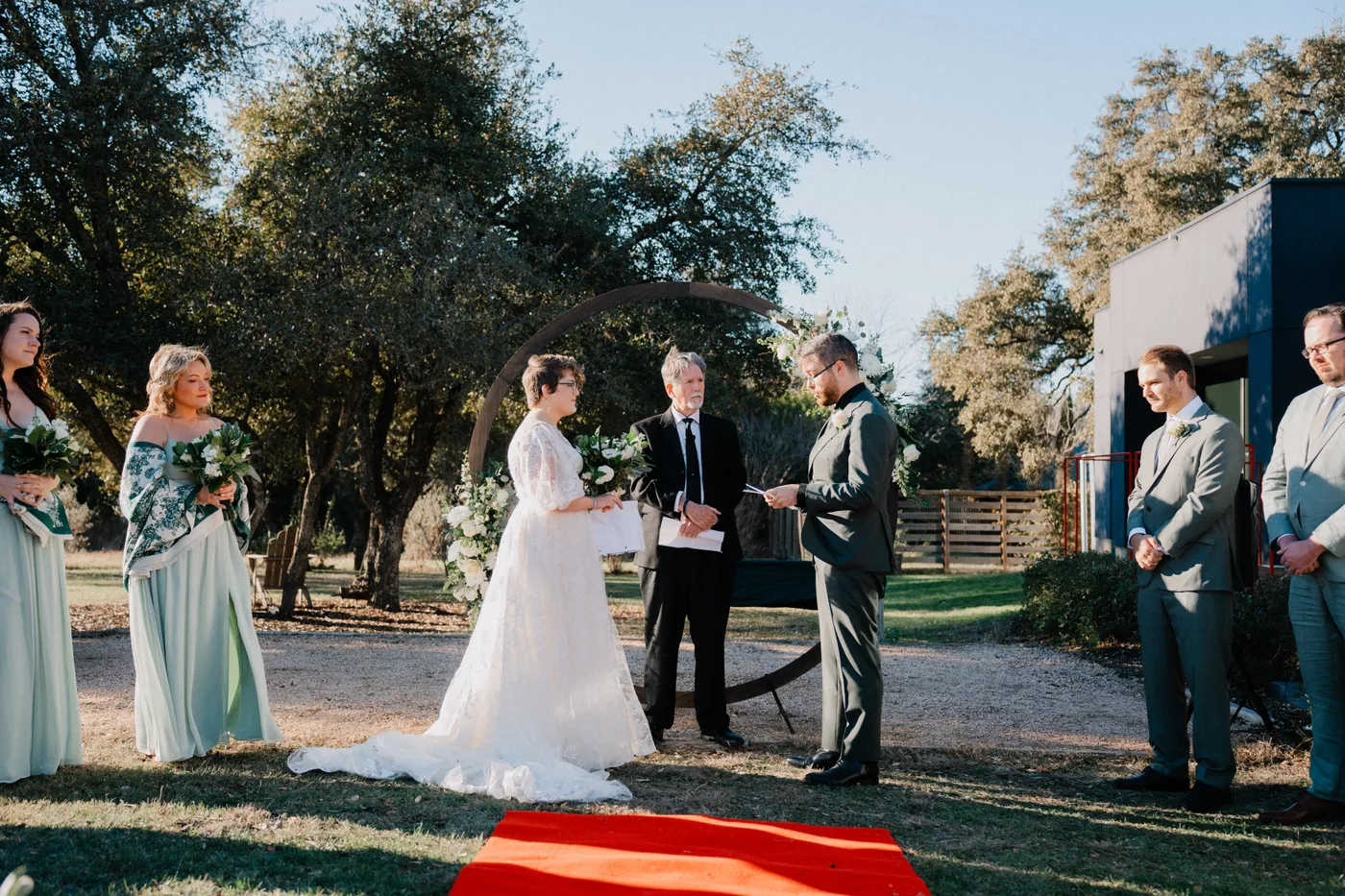
Here’s a photo. View our talented photographers’ portfolio, and consider hiring them, at jyangphoto.com
Because it is the nature of love to create, a marriage itself is something which has to be created, so that, together, we become a new creature.
To marry is the biggest risk in human relations that a person can take… If we commit ourselves to one person for life this is not, as many people think, a rejection of freedom; rather, it demands the courage to move into all the risks of freedom, and the risk of love which is permanent; into that love which is not possession but participation… It takes a lifetime to learn another person… When love is not possession, but participation, then it is part of that co-creation which is our human calling, and which implies such risk that it is often rejected.
Madeleine L’Engle, The Irrational Season
Darien and I were married on Saturday. I started writing a version of this three days before, thought “what the hell am I doing?” and went back to preparation including completing my vows and statement. As a child, the first church where I belonged had members write their own vows. This made sense. As a chronic skeptic, I wanted to write my own vows. Were something not in my own words, I don’t know that I’ve truly internalized it.
At my bachelor party the previous weekend, a friend told me that she looks forward to her boyfriend proposing. She too had objected to marriage, and I was surprised that she’s now discussing wedding budgets. Paraphrasing her words, it means a lot to him, she wants him to be happy, and her previous objection pales compared to his perspective and their shared values. I’d considered before whether that would be enough for me, and it wasn’t. Marriage as a compromise is imbalanced, and I can’t commit myself to something without intrinsic personal meaning. Between my own writing, discussion with Darien, and discussion with Jim, I can describe that meaning in first principles.
My feelings regarding marriage changed when Darien and I first discussed our life goals. I wouldn’t say I “didn’t believe” in marriage—how do you not “believe” in such a finite and measurable institution? I can’t observe and therefore don’t believe in a god, and so I call myself an atheist. Marriage is observable, but often it and its outcomes are disagreeable. So I objected to marriage. A couple’s commitment and mutual love exists platonically, independently of the state and outside observers. We can have and raise kids without reinforcing marriage’s rigid gender norms and expectations. Our mutual feelings don’t need the state’s approval or the peerage of bad actors using marriage as a means of control. Why be party to an institution that enshrines men to the detriment of women’s agency? I can’t abstain[1] to the privileges granted me within patriarchy, but I could object to its tools in—among others—marriage.
We discussed on kids, community, and the drive forward.[2] Lifelong learning, continual renewal, and the fear of entropy.[3] A dearth of self-reliance becomes codependence, but in recognizing that we better each other we observe our smallness amongst the human experience. We’re small, and have so much to gain and so far to grow. [4]
I’ve realized that I can be party to marriage as a mutual commitment to continually build each other up, and to grow together. I object to love as possessive restriction, but recognize that together we create a love that mutually reinforces and improves. Margaret L’Engle wrote: “Because it is the nature of love to create, a marriage itself is something which has to be created, so that, together we become a new creature.”
Marriage is, to me, recognizing that I look forward not just to growing old together, but being continually improved by your presence. The person I am pales beside the person I’ll be with you.
In Saturday’s ceremony, Jim had us read our own statements of intent to each other. Mine follows.
Darien, I know we’ve seen many different examples of love and partnership. Marriage as a commitment can be either limiting or enriching, controlling or freeing, possessive or widening. Marriage as an institution can be either stifling or secure. We’ve seen Love be self-justifying and excusatory, whereas it can instead call us to a higher mutual standard.
Because of you, I know that love is not just emotion, but an invitation to become more. I intend for us a love that leaves a better world. Ours will be a love that calls us to responsibility and accountability, built upon our word and mutual respect. Ours be a love that opens, and continues the rest of our lives.
My mother read the opening L’Engle quote, and then we spoke vows to each other as a mutual covenant. Jim proposed these vows to us following conversation with us both, and they couldn’t have been closer to what we both needed from each other.
Darien, I take you as my partner in life.
I promise to grow with you and learn from you in all the years ahead.
I promise our home will always be safe for you physically and emotionally.
I will work with you to make this a kinder and wiser world.
I promise to love you for the rest of my life.
Now I need to go change my name. “Nichols-Higgins” has an exciting ring.
Work against or productively use, yes, but like white privilege it’s an intrinsic part of my person. ↩︎
“The drive forward” meaning both “forward momentum” and “the drive around Iceland’s Ring Road” we spent the following week on. ↩︎
Not “never stop moving”—this is less anxious energy and more a desire to continually growth. ↩︎
Not specifically regarding romanticism, but rather both friendship and romantic partnership. ↩︎
- Feb 22, 2025